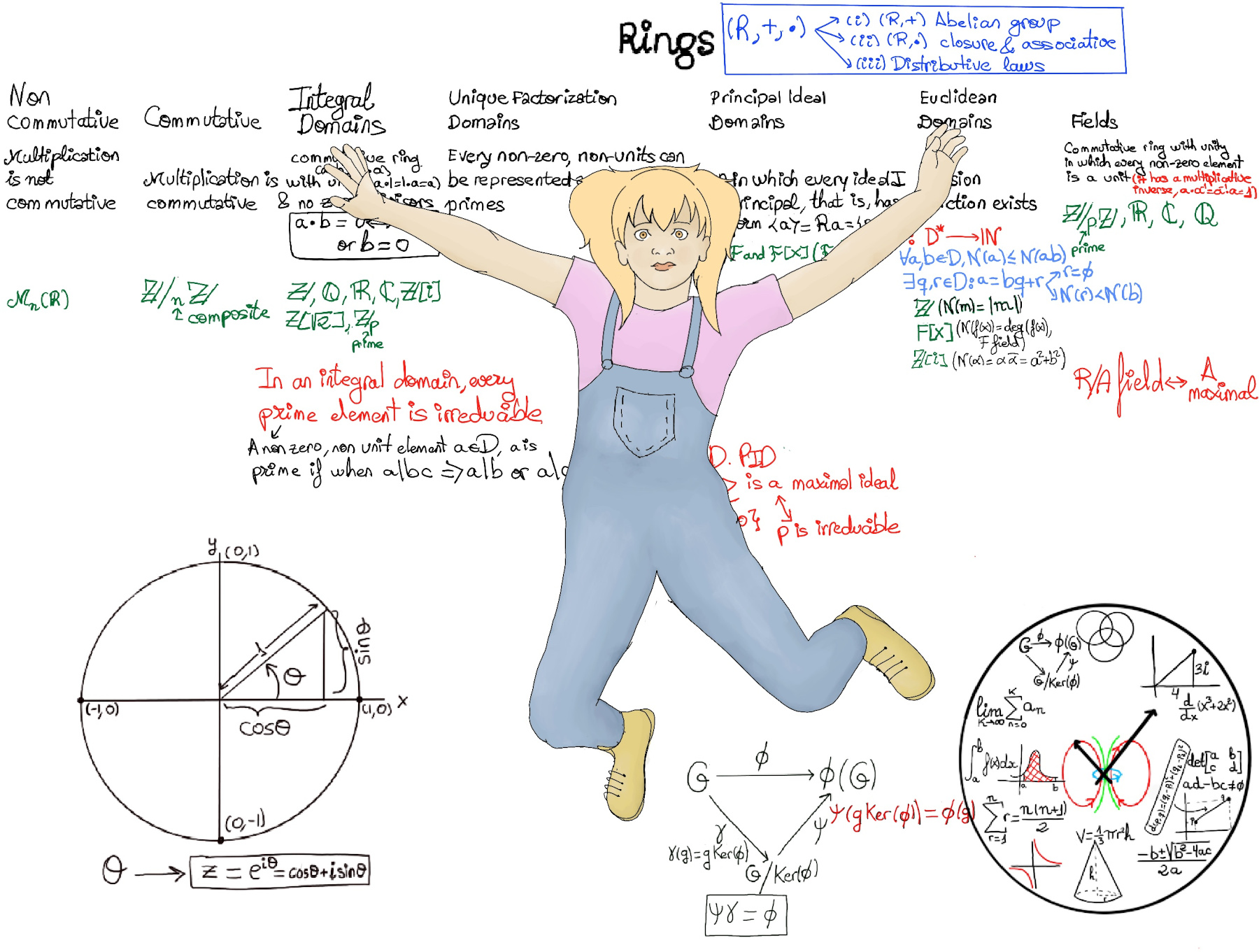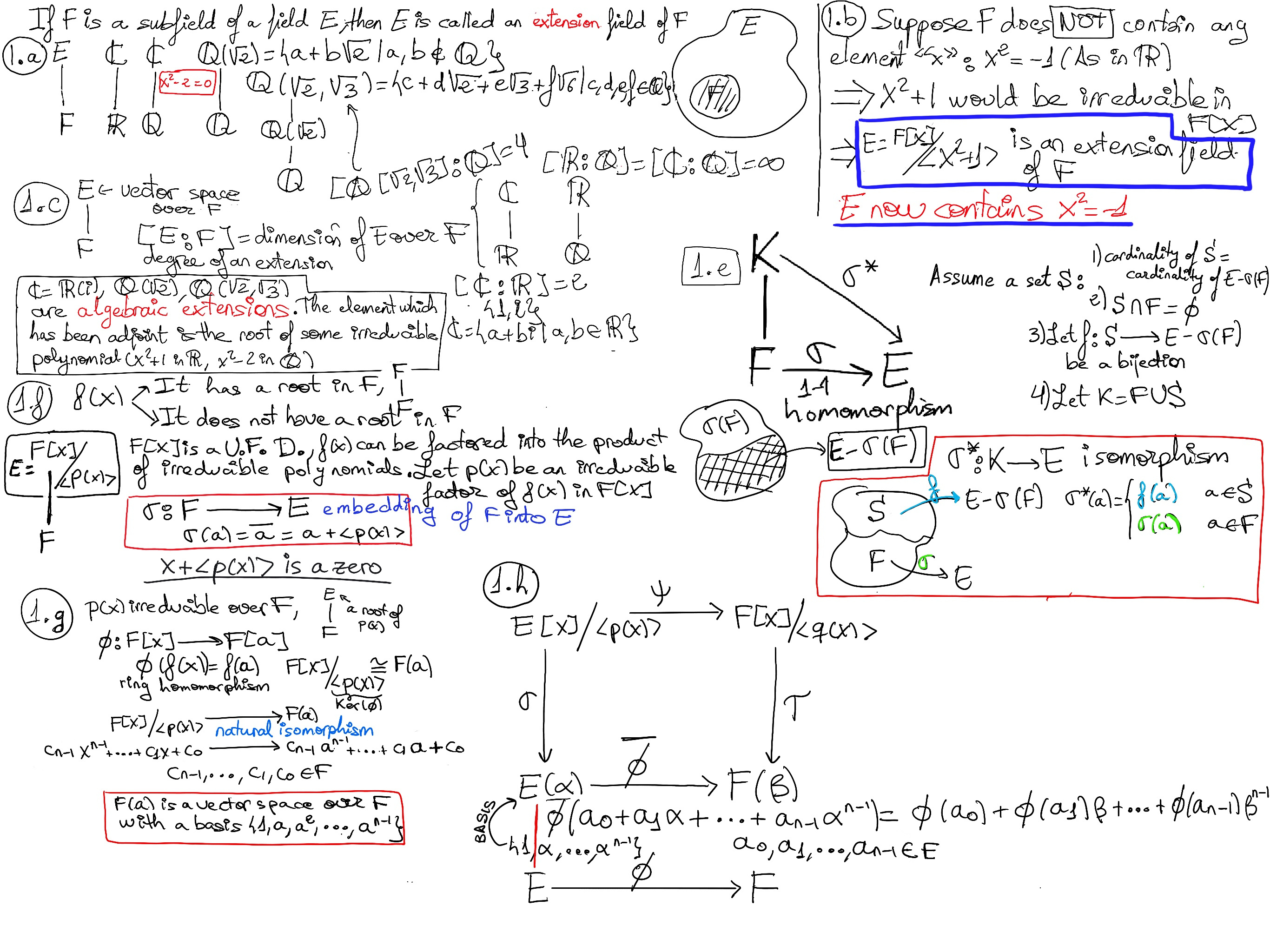
|
 |
 |

|
 |
 |
“Oh, money, the best deodorant, companion, motivator, and sex appeal. There are things far more important than money, but they all cost money and they won’t date you if you don’t have any cash,” Apocalypse, Anawim, #justtothepoint.
Theorem. Let E and F be two fields, and let σ: F → E be an embedding of a field F into a field E. Then there exist a field K such that F is a subfield of K and σ can be extended to an isomorphism of K onto E.

Krnoecker’s Theorem. Existence of extension. Let F be a field and let f(x) be a non-constant polynomial in F[x]. Then, there exists an extension E of F in which f(x) has a root or zero. (Figure 1.f)
Theorem. Let p(x) be an irreducible polynomial in F[x] and let u be a root of p(x) in an extension E of F. Then,
F(u), the subfield of E generated by F and u is the smallest field containing F and u. It is indeed F[u], the smallest subring containing both F and u = {b0 + b1u + ··· + bmum ∈ E | b0 + b1x + ··· + bmxm ∈ F[x]}
If the degree of p(x) is n, the set (1, u, ···, un-1) forms a basis of F(u) over F, i.e., each element of F(u) can be written uniquely as c0 + c1u + ··· + cnun-1 where ci ∈ F, and [F(u):F] = n.

Definitions. An element α ∈ E is algebraic over F if there exists a non-constant polynomial p(x) ∈ F[x] such that p(α)=0, i.e., α is the root of p(x). Example: E = ℂ, F = ℚ, α = $\sqrt{2}$ is algebraic over ℚ, p(x) = x2 -2, and p($\sqrt{2}$)=0. Similarly, i is algebraic over ℚ, p(x) = x2 + 1, p(i) = 0. An element that is not algebraic, i.e., there no exists a non-constant polynomial p(x) such that p(α)=0 is called transcendental, e.g., π.
An extension E of F is called algebraic if each element of E is algebraic over F. An extension that is not algebraic, it is called transcendental, e.g, the extension ℝ over ℚ is a transcendental extension, and ℂ = ℝ(i) and ℚ($\sqrt{5}$) are algebraic extensions over ℝ and ℚ respectively (x2 + 1, x2 -5).
The minimal polynomial of u over F is the monic (the leading coefficient is equal to 1) irreducible polynomial in F[x] of which u is a root.
Theorem. Let E be an extension field of F, and let u ∈ E be algebraic over F. Let p(x) ∈ F[x] be a polynomial of least degree such that p(u) = 0, we call p the minimal polynomial of u over E, Then,
(i) p(x) is irreducible over F
(ii) if g(x) ∈ F[x] is such that g(u) = 0, then p(x) | g(x)
(iii) There is exactly one monic polynomial p(x) ∈ F[x] of least degree such that p(u) = 0. This monic polynomial always exists because we can always divide the minimal polynomial by its leading coefficient, and still u be a root.
Proof.
(i) Let’s suppose for the sake of contradiction, that p(x) is reducible over F. Let p(x) = p1(x)·p2(x) such that deg(p1(x)), deg(p2(x)) < deg(p(x)).
We know that u is a root of p(x) ⇒ p(u) = 0 ⇒ p1(u)·p2(u) = 0 ⇒ p1(u) = 0 or p2(u) = 0, and deg(p1(x)), deg(p2(x)) < deg(p(x)), i.e., u satisfies a polynomial of degree less that p(x) ⊥ [By assumption, p(x)∈ F[x] is a polynomial of least degree such that p(u) = 0]. Therefore, p(x) is irreducible.
(ii) Let g(x) ∈ F[x] such that g(u) = 0. By the division algorithm, g(x) = p(x)q(x) + r(x) where r(x) = 0 or degree(r(x)) < deg(p(x)) ⇒
(iii) Let’s assume by reduction to the absurd, that g(x) is another monic polynomial of least degree which g(u) = 0 ⇒ [By (ii)] g(x)| p(x). However, p(x)|g(x) just by interchanging the roles of p(x) and g(x) and using (ii) again, g(x)|p(x) ⇒ p = Φ·g, g = ψ·p ⇒ p = Φ·ψ·p [When we multiply polynomials, their degrees are added, deg(f·g) = deg(f) + deg(g)] deg(Φ·ψ) = 0 ⇒ Φ and ψ need to be constant ⇒ [Since both p(x) and g(x) are monic polynomials, that is, the leading coefficients are 1] p(x) = g(x) ∎
Theorem. If E is a finite extension of F, then E is an algebraic extension of F.
Proof. Let’s select an arbitrary element of E, say u ∈ E, and [E:F] = n. The set {1, u, ··· , un-1, un} is linearly dependent ⇒ there exists a0, a1, ···, an (not all zero) in F such that a0 + a1u + ··· anun = 0. Thus, we have found a polynomial f(x) = a0 + a1x + ··· anxn ∈ F[x] such that u in E is a root. Then, u ∈ E is an algebraic element over F. Moreover, u ∈ E was selected completely as an arbitrary of E. Hence, E is an algebraic extension of F ∎
Proposition. If p(x) is the minimal polynomial of α over F and degree(p(x))= n. Then, [F(α):F] = n, and, in particular, it is finite, so by our previous result, F(α) is an algebraic extension. More formally, if E is an extension of F and α ∈ E is algebraic over F, then F(α) is an algebraic extension of F and deg(F(α):F)=deg(p(x)) where p is the minimal polynomial of α.
Proof.
Let p be the minimal polynomial of α over F, say p(x) = xn + an-1xn-1 + ··· +a0 where ai ∈ F.
We claim that the collection {α0=1, α, α2, ···, αn-1} is a basis for F(α).
Lineal independence. Suppose β0·1 + β1α + ··· + βn-1αn-1 = 0, βi∈ F. If βi are not all zeros, consider the polynomial f = β0 + β1x + ··· + βn-1xn-1. Then, f(α)=0, f is a non-zero polynomial (f ∈ F[x]) of degree n-1 < n ⊥ (p is the minimal polynomial of α).
Spans. F(α) = F[α] = {$\sum_{i=0}^m β_iα^i$| m ∈ ℕ, βi ∈ F}. Obviously F[α] ⊆ F(α), since F[α] is the minimal subring containing F and α. Besides, F(α) ⊆ F[α] is obvious, too, just take all coefficients βi to zero except β1=1 to get α, and similarly you can get all elements of F. It is more complicated to show that F[α] is a field, that is, it is closed under all field operations.
Finally, F(α) = F[α] = $\sum_{i=0}^m β_iα^i$| m ∈ ℕ, βi ∈ F} =[💡{α0=1, α, α2, ···, αn-1} linear independence] $\sum_{i=0}^{n-1} β_iα^i$| βi ∈ F}. Consider p = xn + axn-1 + ··· +a0. Then, 0 = αn + an-1αn-1 + ··· +a0 ⇒ αn = -an-1αn-1 + ··· -a0, so we can express αn as a linear combination of {1, α, ···, αn-1}, and we can apply the same idea with αm, m > n, and therefore, F[α] = $\sum_{i=0}^m β_iα^i$| m ∈ ℕ, βi ∈ F} = $\sum_{i=0}^{n-1} β_iα^i$| βi ∈ F}.
Fact. Every finite extension is an algebraic extension, but the converse is not true, i.e., every algebraic extension is not a finite extension.
Example. E = ℚ($\sqrt{2},\sqrt{3},···,\sqrt{p}$) the smallest subfield of ℝ containing the rationals and all square root of positive primes is an algebraic extension but it is not a finite extension.
(i) E is an algebraic extension. Let α ∈ E ⇒ ∃r ∈ ℤ+ such that α ∈ ℚ($\sqrt{p_1},\sqrt{p_2},···,\sqrt{p_r}$). We know that ℚ($\sqrt{p_1},\sqrt{p_2},···,\sqrt{p_r}$) is a finite extension of degree 2r ⇒ [Every finite extension is algebraic] α is algebraic over ℚ, and α was selected arbitrary, so E is an algebraic extension.
Notice that ℚ($\sqrt{2}$), its corresponding polynomial is x2-2 = 0, then the degree of the extension is 2. Analogously, ℚ($\sqrt{2}, \sqrt{3}, \sqrt{5}$) their corresponding polynomials are x2 -2, x2 -3, and x2 + 5, so the degree of the extension is 2·2·2 = 6 = 23.
(ii) E is an infinite extension. Claim: Each new adjunction of the square root of a prime is a proper extension, i.e. ℚ ⊂ ℚ($\sqrt{2}$) ⊂ ℚ($\sqrt{2}, \sqrt{3}$) ⊂ ···
Let F = ℚ($\sqrt{p_1},\sqrt{p_2},···, \sqrt{p_n}$) where pi i=1, ··· n are distinct primes. Let’s show that ℚ($\sqrt{p_1},\sqrt{p_2},···, \sqrt{p_n}, \sqrt{q}$) is a proper extension of F, we must show that $\sqrt{q}$ ∉ F, and prove it by using induction on n.
Let F0 = ℚ($\sqrt{p_1},\sqrt{p_2},···, \sqrt{p_{n-1}}$), F = F0($\sqrt{p_n}$) is an extension F of Fo of degree 2 -a proper extension-, i.e. [F:F0] = 2 because $\sqrt{p_n}$ is a root of x2 -pn ∈ F0[x], and x2 -pn is irreducible in Fo[x].
We want to prove that $\sqrt{q}$ ∉ F = ℚ($\sqrt{p_1},\sqrt{p_2},···, \sqrt{p_{n}}$), so it is possible to create a proper extension ℚ($\sqrt{p_1},\sqrt{p_2},···, \sqrt{p_{n}}, \sqrt{q} $).
Let’s assume by reduction to the absurd that $\sqrt{q}$ ∈ F = F0($\sqrt{p_n}$) ⇒ $\sqrt{q} = a·1 + b·\sqrt{p_n}$ where a, b ∈ F0 ⇒ $q =a^2+b^2p_n+2ab\sqrt{p_n} ⇒ 0 = a^2+b^2p_n+2ab\sqrt{p_n}-q$ ⇒[This is a second equation ax2+ bx +c where the roles are a = b2, b = 2ab, c = a2-q] $\sqrt{p_n}=\frac{-2ab±\sqrt{4a^2b^2-4(a^2-q)b^2}}{2b^2}=\frac{-2ab±2b\sqrt{q}}{2b^2}=\frac{-a}{b}±\frac{\sqrt{q}}{b}$ ∈[a, b ∈ Fo and by assumption, $\sqrt{q}$ ∈ F = F0($\sqrt{p_n}$)] F0, $\sqrt{p_n} ∈$ F0 = ℚ($\sqrt{p_1},\sqrt{p_2},···, \sqrt{p_{n-1}}$) which is a contradiction because F = F0($\sqrt{p_n}$) is a proper extension of F0 ⇒ $\sqrt{q}$ ∉ F ⇒ ℚ ⊂ ℚ($\sqrt{2}$) ⊂ ℚ($\sqrt{2}, \sqrt{3}$) ⊂ ··· is an infinite properly ascending chain and E is not a finite extension of ℚ∎
Theorem. If f ∈ K[x] is monic, irreducible, (it cannot be written as a product of non constant polynomials)and f(α)= 0, then f is the minimal polynomial of α.
Proof. Suppose that f ∈ K[x] monic, irreducible, and f(α) = 0.
Suppose by reduction to the absurd, that f is not the minimal polynomial of f ↭ there is such a polynomial Φ, Φ|f ⇒ f = Φ·g ⇒ [By assumption, f is irreducible] g is constant, g ∈ K ⇒ [f is monic] g = 1 ⇒ f = Φ∎
Example. The number $\sqrt{2}$ has minimal polynomial x2 -2 over ℚ, but x2 -2 is not irreducible over ℝ. x2 -2 is monic, f($\sqrt{2}$) = 0, and it is irreducible over ℚ, so it is the minimal polynomial of $\sqrt{2}$.
Suppose for the sake of contradiction, x2-2 is not irreducible over ℚ ↭ ∃a, b, c, d ∈ ℚ such that (ax + b)(cx +d) = x2 - 2 ⇒ ac = 1, bc + ad = 0, and bd = -2 ⇒ ∃a, b, c, d ∈ ℚ such that b = ±$\sqrt{2}$a, a ≠ 0, c = 1/a, d = ±$\sqrt{2}$/a ⊥ ⇒ x2 -2 is irreducible over ℚ